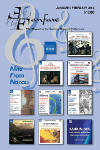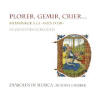Texte paru dans: / Appeared in:

Fanfare Magazine: 36:3 (01-02/2013)
Pour
s'abonner / Subscription information
Les abonnés à Fanfare Magazine ont accès aux archives du
magazine sur internet.
Subscribers to Fanfare Magazine have access to the archives of the magazine
on the net.
Aeon
AECD1226

3760058360262 (ID270)
Consultez toutes les évaluations recensées pour ce cd
~~~~ Reach all the evaluations located for this CD
Subtitled “Homage to the golden voice of Johannes Ockeghem” (a phrase taken from the Lupi work), this is a marvelous program of music to mark the death of Ockeghem in 1497. It is 15 years too late to be an anniversary issue, but that seems to be irrelevant. The disc takes its title from the first motet-chanson, “To lament, to moan, to shout,” written as a memorial to Ockeghem, apparently a first recording, since the text had to be completed for this performance. Josquin wrote his motet-chanson for the same occasion, alluding to Ockeghem’s earlier motet on the death of Binchois. Busnois’s motet honoring Ockeghem dates back earlier, to around 1467, when the two composers were working together in Tours. Johannes Lupi wrote his lament for Ockeghem (to a text by Erasmus) more than 20 years after his death. The piece by Lupi (not to be confused with a musician and priest who lived a century earlier) has been recorded by the Hilliard Ensemble (Fanfare 31:2) and earlier by Richard Taruskin (10:4). The Busnois piece on the same Hilliard program was also recorded by Edward Wickham (19:5) among others. The Josquin lament has been well served on records, notably in two all-Josquin programs by the Hilliard Ensemble (7:6; CD in 11:4, now on Virgin) and the Orlando Consort (34:1).
Obrecht’s Mass, already recorded by János Bali, is the major work on the disc, but is a little out of place. As Guerber admits in the notes, Barton Hudson proposed that the Mass was written as a posthumous homage to Ockeghem, but Rob Wegman refuted this convincingly in Born for the Muses, his detailed work on Obrecht’s Masses. He dates it on stylistic grounds to the early 1480s, along with two other Masses of that time that show the strong influence of Ockeghem. His Missa Mi-Mi is borrowed for the bass line in this Mass. While Bali’s series of Obrecht recordings was useful, this vocal-ensemble rendition is preferable. So all five works fit the description of homage to Ockeghem.
This ensemble has made a steady stream of recordings for two decades now, each program well conceived and executed. I am more pleased than ever with their recent programs. Even if there is only one recording premiere, the juxtaposition of this music is valuable. The Hilliard disc cited earlier, another tribute to Ockeghem actually made for the anniversary year, is the closest thing to this program. This disc is an easy choice for anyone who is interested in the era.
Cliquez l'un ou l'autre
bouton pour découvrir bien d'autres critiques de CD
Click either button for many other reviews


